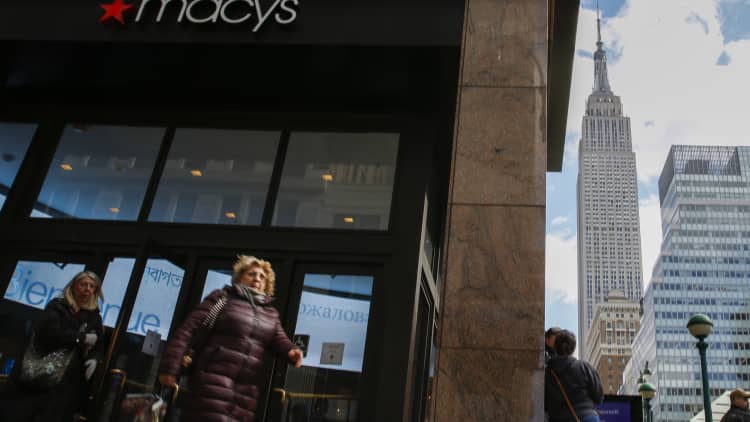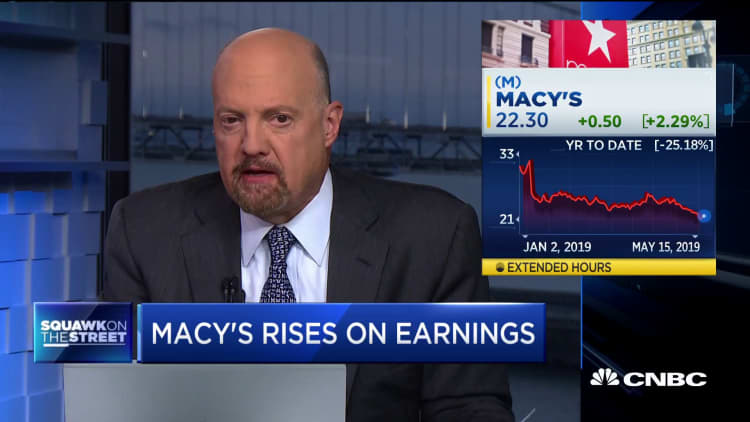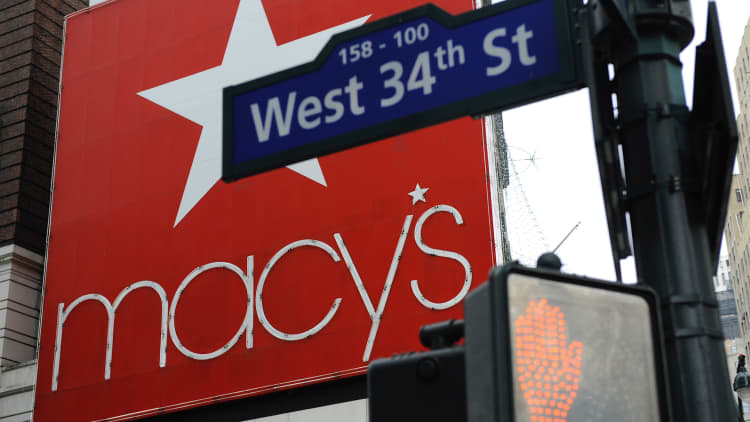
Macy's reported first-quarter earnings and same-store sales that topped analysts' expectations, as its initiatives to refresh outdated stores and get more people to shop using its mobile app showed signs of paying off.
But its sales still fell from a year ago, as the department store chain continues to face many of the same challenges impacting all retailers today. It's not easy to draw people to the mall to buy clothes, when they could just shop on online at Amazon, or from platforms like Stitch Fix and Rent the Runway.
Its shares initially soared more than 7% in premarket trading. But the stock was last up less than 1%, as talk of additional tariffs impacting the retailer rattled investors.
Macy's also reaffirmed its previously issued financial outlook for the full year.
Here's what Macy's reported compared with what analysts were expecting, based on Refinitiv data:
* Earnings per share: 44 cents vs. 33 cents expected
* Revenue: $5.504 billion vs. $5.505 billion expected
* Same-store sales: up 0.7% vs. a decline of 0.2% expected, on an owned plus licensed basis
CEO Jeff Gennette said e-commerce revenues grew at a double-digit percentage rate during the quarter, while mobile remained Macy's fastest-growing channel for sales growth.
However, the timing of Easter, which fell later in the season this year than last, hurt sales, as did the colder, wetter weather that has blanketed much of the country this spring, he said.

But Macy's is doing especially well with its most loyal shoppers, the CEO said. Transaction growth of 5.7% during the quarter was driven by Macy's most loyal customers "shopping more frequently than ever," Gennette said.
Macy's reported net income for the quarter ended May 4 of $136 million, or 44 cents a share, compared with $139 million, or 45 cents per share, a year ago. That was ahead of analysts' expectations for 33 cents, based on Refinitiv data.
Revenue dropped to $5.504 billion from $5.541 billion, but was in-line with expectations of $5.505 billion.
Sales at Macy's stores open for at least 12 months, on an owned plus licensed basis, were up 0.7%, better than an expected 0.2% drop.
For fiscal 2019, Macy's is still calling for net sales to be about flat with the prior year. Same-store sales, on an owned plus licensed basis, are estimated to be flat to up 1%. And Macy's still expects adjusted earnings per share to fall within a range of $3.05 to $3.25. Analysts had been calling for annual earnings of $3.09 a share.
In February, Macy's said it would be cutting about 100 management jobs, targeting $100 million in annual cost savings, working to get out of a sales slump.
It's been trying to clean up its apparel offering, as inventories have been inflated in the past, with items left sitting on shelves unsold and thus pressuring profits.
Not showing as much progress there as Wall Street would've hoped, Macy's inventory levels ended the first quarter "heavier than normal," Gordon Haskett analyst Chuck Grom said, "and even higher than the end of the year when Macy's had a disappointing fourth-quarter print."
More broadly, Macy's is still trying to find trend-right fashion to compete with the likes of Zara, Lululemon and Madewell.
"We believe the biggest department store sector vulnerability remains women's apparel — and specifically the need to better attract and retain new millennial and Generation Z customers," Cowen & Co.'s retail analysts said in a research note ahead of earnings.
Some of Macy's other recent initiatives to draw shoppers in include adding rotating marketplaces for popular brands in more than two dozen stores, using virtual-reality headsets to sell furniture and rolling out a mobile checkout option across the U.S. to cut costs and grow sales. Macy's has also said it plans to start downsizing some of its larger locations, not requiring so much real estate.
The company is also still growing its off-price business, Macy's Backstage, which rivals the likes of TJ Maxx, Nordstrom Rack and Burlington, selling clothes at discounted prices. Macy's opened 120 Backstage locations within existing Macy's shops last year and plans to open 50 more this year.
Macy's, with a market cap of roughly $6.7 billion, has watched its shares fall nearly 27% so far this year. That's compared with the S&P 500 Retail ETF's (XRT's) gains of about 5%.
Meantime, tariffs are still another looming threat for retailers like Macy's, with the White House just earlier this week releasing a fresh list for about $300 billion in Chinese goods that President Donald Trump has said he's contemplating hitting with tariffs as high as 25%. The list includes everything from clothing and sneakers to sporting goods and other accessories, often found at the mall.
Gennette on Wednesday said Macy's has been working closely with its Chinese partners, shifting some production and remaining "hopeful" that a 25% tariff on apparel and shoes wouldn't go into effect. Should that happen, "when you do the math, it's hard to find a path through that wouldn't impact customers," he said.




